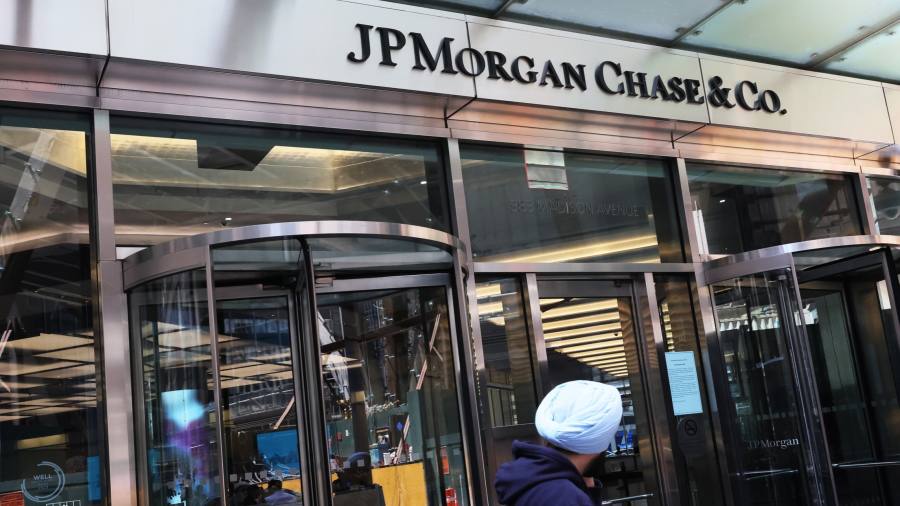JPMorgan Chase can examine records from Manhattan prosecutors related to litigation over its decision to retain Jeffrey Epstein as a client, a New York judge ruled on Friday, including any potential sexual abuse complaint involving former executive Jes Staley.
The US lender first subpoenaed the Manhattan district attorney’s office earlier this month, requesting any statements made by any “individual identifying James ‘Jes’ Staley as an alleged witness or an alleged perpetrator of any sexual assault, sexual abuse, or other sex-related crimes”.
The bank has sued Staley, seeking to make him liable for damages it may have to pay in connection with two cases brought against JPMorgan by an Epstein accuser and the US Virgin Islands, where the late sex offender once had a home. The accuser’s case alleges that Staley raped her and watched her being abused by Epstein. Staley has strongly denied the allegations, calling them “slanderous”.
The order from Judge Jed Rakoff, who is overseeing the cases in Manhattan federal court, came hours after JPMorgan chief executive Jamie Dimon was set to begin answering questions under oath about his knowledge of Epstein’s crimes, as the legal reckoning over the bank’s decision to retain him as a client reached Wall Street’s highest echelons.
The sworn testimony, which the US’s largest lender had tried to prevent from happening, marks a significant escalation in two high-profile cases over JPMorgan’s 15-year relationship with Epstein, which has embarrassed some current and former executives and shone an unflattering light on the bank’s internal compliance processes. The deposition will take place behind closed doors and is set to last up to two days.
Dimon’s name has already come up in the contentious litigation, with the lawsuits against JPMorgan having been filed towards the end of last year. He was referenced in an internal email expressing concerns about Epstein, containing the words “pending Dimon review”.
Mary Erdoes, a top JPMorgan executive, told lawyers in a sworn deposition in March that Dimon was solely in charge of supervising Staley, who was at the bank for decades and for a period managed the relationship with Epstein, according to people familiar with the matter. JPMorgan’s lawsuit against Staley alleges he misled the bank about Epstein’s misdeeds.
In a statement, JPMorgan said its boss had never met with Epstein, “spoke with him, [or] emailed with him, and was not involved in any decisions about his account”. The bank added: “The plaintiffs know this based on decades of discovery and millions of emails . . . yet they persist in pursuit of publicity.”
Yet the cases remain one of the few blots on the copy book of the longtime executive. He recently announced an almost $16bn spending spree at JPMorgan, has been at the forefront of Wall Street’s lobbying efforts for a deal on the US debt ceiling to avoid default, and scooped up First Republic, a failed lender, in a government-led auction.
JPMorgan first took on Epstein as a client in 1998 and continued to bank him until 2013.
Dimon is expected to testify that he did not have any knowledge of the multiple internal red flags raised about Epstein’s accounts. Nonetheless, the cases have raised questions more generally about the robustness of the bank’s controls.
“It is actually not good news if Dimon didn’t know,” a person familiar with the bank’s organisational structure said. “If nobody ever reached out to him in roughly a decade of continuing to bank [Epstein] when they knew of his conduct and when it was public, that is perhaps even worse news.”
JPMorgan has called Epstein’s scheme “monstrous” and expressed regret for having him as a client. “In hindsight, any association with [Epstein] was a mistake . . . but we did not help him commit his heinous crimes.”
Last week, Deutsche Bank settled separate Epstein-related claims for $75mn, which will be shared among dozens of women.
The stakes for JPMorgan could soon be even higher. While Dimon is being deposed on Friday, a federal judge in New York will hear arguments from representatives of the Epstein accusers, who contend that dozens, if not hundreds of women should be entitled to compensation from the bank, which they accuse of profiting from human trafficking.
On the eve of Dimon’s deposition, JPMorgan fired back at the US Virgin Islands, alleging in court filings that the territory’s officials had turned a blind eye to Epstein’s crimes, and even issued visas to some of his victims.
“Epstein could have lived anywhere in the world. He chose USVI,” JPMorgan’s lawyers said. “They shielded and even rewarded him, granting him [millions of dollars] in tax incentives . . . looking the other way when he walked through USVI airports accompanied by girls and young women.”
In response, the US Virgin Islands attorney-general’s office said such accusations were “an obvious attempt to shift blame away from JPMorgan Chase, which had a legal responsibility to report the evidence in its possession of Epstein’s human trafficking, and failed to do so”.
Epstein pleaded guilty in 2008 to a state charge in Florida of soliciting a minor for prostitution. More than a decade later he was charged by federal prosecutors with sex trafficking, and died by suicide in jail in 2019 while awaiting trial.
Read the full article here




